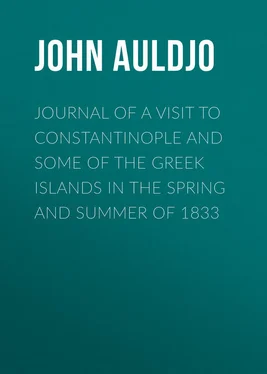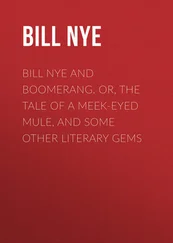John Auldjo - Journal of a Visit to Constantinople and Some of the Greek Islands in the Spring and Summer of 1833
Здесь есть возможность читать онлайн «John Auldjo - Journal of a Visit to Constantinople and Some of the Greek Islands in the Spring and Summer of 1833» — ознакомительный отрывок электронной книги совершенно бесплатно, а после прочтения отрывка купить полную версию. В некоторых случаях можно слушать аудио, скачать через торрент в формате fb2 и присутствует краткое содержание. ISBN: , Жанр: foreign_antique, foreign_prose, Путешествия и география, на английском языке. Описание произведения, (предисловие) а так же отзывы посетителей доступны на портале библиотеки ЛибКат.
- Название:Journal of a Visit to Constantinople and Some of the Greek Islands in the Spring and Summer of 1833
- Автор:
- Жанр:
- Год:неизвестен
- ISBN:http://www.gutenberg.org/ebooks/27484
- Рейтинг книги:3 / 5. Голосов: 1
-
Избранное:Добавить в избранное
- Отзывы:
-
Ваша оценка:
- 60
- 1
- 2
- 3
- 4
- 5
Journal of a Visit to Constantinople and Some of the Greek Islands in the Spring and Summer of 1833: краткое содержание, описание и аннотация
Предлагаем к чтению аннотацию, описание, краткое содержание или предисловие (зависит от того, что написал сам автор книги «Journal of a Visit to Constantinople and Some of the Greek Islands in the Spring and Summer of 1833»). Если вы не нашли необходимую информацию о книге — напишите в комментариях, мы постараемся отыскать её.
Journal of a Visit to Constantinople and Some of the Greek Islands in the Spring and Summer of 1833 — читать онлайн ознакомительный отрывок
Ниже представлен текст книги, разбитый по страницам. Система сохранения места последней прочитанной страницы, позволяет с удобством читать онлайн бесплатно книгу «Journal of a Visit to Constantinople and Some of the Greek Islands in the Spring and Summer of 1833», без необходимости каждый раз заново искать на чём Вы остановились. Поставьте закладку, и сможете в любой момент перейти на страницу, на которой закончили чтение.
Интервал:
Закладка:
THE PASHA'S GATE. If these objects were calculated to excite feelings of disgust, the scene which next presented itself was beautiful as fairy land. The ship sailed close under the lofty wall of the seraglio garden, which is separated from the sea by only a narrow wharf. Shady groves, bowers of oranges, roses and jasmine, lofty cypresses, and wide spreading plane trees, embosom the elegant pagoda-shaped buildings, which comprise the kiosks of the Sultan, and the women's apartments; all of which, together with the stables and other inferior offices, are richly gilt and painted of various gaudy colours. Near one of the seraglio gates is erected a large wooden house, where many a disobedient Pasha has awaited the decree of banishment issued against him by his imperious master. There, too, he was shipped on board the vessel destined to carry him into exile; or, if condemned to expiate his offences with his life, it was there the bowstring was applied. Hence this entrance is known by the appellation of the Pasha's gate. A little further on, we observed a small low door in the wall, scarcely high enough to admit an ordinary sized man. Through this opening the slaves newly purchased, for either the Sultan or Sultana, are conveyed into the palace; through it also, they make their exit, when barbarous jealousy or revenge prompts their destruction; and many a lovely Dudú or Lolah, and many a fair Sultana sewn in the cruel sack, have been borne through this fatal opening, and cast into the
"Rolling waves, which hide
Already many a once love-beaten breast,
Deep in the caverns of the deadly tide."
BEAUTIES OF STAMBOUL. We now sailed round the promontory of the Golden Horn, when all the beauties of Stamboul, Pera, the Bosphorus, and Scutari, burst suddenly upon the view. Looking towards the seraglio point is seen the richly gilded palace of the Sultan, with a gate that glitters as if formed of polished gold; and backed by a profusion of foliage, and the buildings of the Serai. Farther distant is St. Sophia and the other mosques, whose golden domes and graceful, tapering minarets, tower above the mass of painted buildings interspersed with dark cypresses and beautiful plane trees, which covers the surface of the "seven hills." Thousands of roses hang clustering on the trellis work which adorns the gardens of the numerous villages, summer palaces, and villas occupying the shores of the Bosphorus, and the harbour between Constantinople and Galata appears crowded with ships, and with numberless caiques, gliding rapidly from shore to shore. PERA. – SCUTARI.Lastly, Pera, with its vast range of cypresses, crowns the hill, and extends along the whole length of the town. Looking in another direction, appears the burying ground of Scutari, also with its cypress grove, many miles in extent; the mosque, and barracks of Sultan Selim; Leander's tower in the channel which we have just quitted; and, lastly, the Turkish fleet of many sail lying at anchor, and displaying all their colours in honour of the Bairam.
Meanwhile, the Actæon held on her silent majestic course towards the destined anchorage; and as I stood upon the quarter deck, contemplating the magnificent objects that presented themselves wherever I turned my sight, I felt all those thrilling emotions of rapture and delight which such scenes are calculated to inspire, and which constitute a sort of oäsis in the memory of those who have experienced them. Here nature and art have gone hand in hand, assisting each other, and scattering roses; here every thing that falls from the bosom of the former is rich and luxuriant, and every thing that proceeds from the latter is novel, extraordinary, in a word, it is oriental ; and faults, which in more civilised communities would be considered inconsistent with good taste, are here ever pleasing, and seem necessary to the unity of the whole.
TURKISH FLEET. A royal salute was fired as we passed the summer palace of Dolma Bashi, where the Sultan at present resides. It was immediately returned by the Mahmoudie, the Capitan Pasha's ship. What splendid vessels! Among them two are three-deckers, the largest ships in the world, one carrying 140, the other 136 brass guns, and the whole armament appeared to be in a condition that would not discredit an English dockyard. Considering how short a period has intervened since the Sultan lost his entire fleet, it is really miraculous to see him with another, amounting to two three-deckers, four line of battle ships, eight frigates, three corvettes, three sloops, and a number of cutters, all completely equipped for active service. The recently erected palace of the Sultan on the Asiatic side of the channel, next came in sight. It consists of a long range of magnificent buildings, painted a rich colour, between fawn and yellow, picked out with white, and profusely ornamented with gilding. The interior, I am told, displays a singular mixture of European and oriental luxury. Parisian furniture, mirrors, and ornaments from Germany, Persian carpets, and hangings, in short every thing rare or beautiful, from the east and west being collected there. CASTLE OF THE JANISSARIES.We now passed the old castle of the janissaries, the first fortress the Turks possessed in Europe. It lies opposite to the beautiful valley of the sweet waters of Asia, where the Sultan has a kiosk: and hither, in summer, the Turkish ladies come on Sundays, Tuesdays, and Fridays, to pic-nic . Formerly, when a janissary was condemned to die, he was confined in this castle. At the appointed hour, he was led through a small arched doorway, which opens on the Bosphorus, and there decapitated, and the body was thrown into the sea; at the same instant the firing of a long gun, which stands by the side of the gate, announced the execution of his sentence.
As I before observed, every portion of the European and Asiatic coast is covered with villas and gardens. The houses are painted of various colours, and have verandas, with trellis work, covered with roses, running round them. Those situated near the water are built with an arched entrance for the caiques, through which, by means of a short canal, they glide into the centre of the court-yard. The water here is very deep, and we were sailing so close to the shore, that the mainyard scarcely cleared the houses. Indeed, instances have occurred, where the inhabitants have been surprised by the visit of a bowsprit pushing its way through the wood-work, and carrying off the roof of their dwellings.
RUSSIAN CAMP. We now came in sight of the Russian encampment, and the tents which covered the summit of an extensive range of hills, called the Unkiar Skelessi, or Giant's Mountain 7 7 Celebrated in history as being the place where the crusaders, under Godfrey of Bulloigne, were encamped.
, resembled so many snowy pinnacles. Their fleet, consisting of ten ships of the line, a number of frigates, and small craft, lay on the opposite side of the channel.
Beyond the village of Jani Keni, and opposite the Sultan's valley, we also found the Russian head quarters established, and a Russian frigate occupying the berth in which the Actæon had anchored twice before. We therefore passed on, and dropped anchor a little a-head of a French frigate, opposite Terapia, and close to the Russian camp. The usual firing immediately commenced, but, by some oversight, the Russian admiral's salute was returned with two guns less than the usual number. In about an hour afterwards, he sent his flag lieutenant, who spoke English, on board the Actæon, to inquire why we had only fired fifteen guns when he had paid the compliment of seventeen. The omission was immediately acknowledged, the two remaining guns discharged, and the gallant lieutenant rowed off again well satisfied. We soon ascertained that this sensitiveness proceeded from their anxiety to convince the Turks that no ill-will existed between England and Russia, and that no insult was meditated by our ship, more particularly as the British ambassador to the Porte, was known to be on board. I doubt much, however, if the Turks, although quite au fait to all matters of ceremony, understood the firing of the two guns afterwards.
Читать дальшеИнтервал:
Закладка:
Похожие книги на «Journal of a Visit to Constantinople and Some of the Greek Islands in the Spring and Summer of 1833»
Представляем Вашему вниманию похожие книги на «Journal of a Visit to Constantinople and Some of the Greek Islands in the Spring and Summer of 1833» списком для выбора. Мы отобрали схожую по названию и смыслу литературу в надежде предоставить читателям больше вариантов отыскать новые, интересные, ещё непрочитанные произведения.
Обсуждение, отзывы о книге «Journal of a Visit to Constantinople and Some of the Greek Islands in the Spring and Summer of 1833» и просто собственные мнения читателей. Оставьте ваши комментарии, напишите, что Вы думаете о произведении, его смысле или главных героях. Укажите что конкретно понравилось, а что нет, и почему Вы так считаете.










![John Bruce - The Lettsomian Lectures on Diseases and Disorders of the Heart and Arteries in Middle and Advanced Life [1900-1901]](/books/749387/john-bruce-the-lettsomian-lectures-on-diseases-and-disorders-of-the-heart-and-arteries-in-middle-and-advanced-life-1900-1901-thumb.webp)

